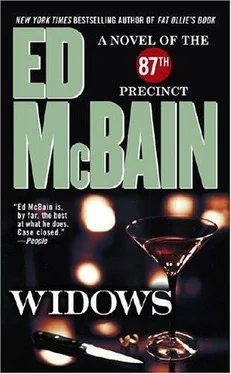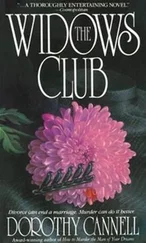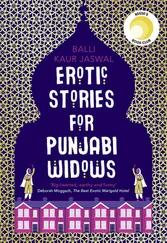Ed McBain - Widows
Здесь есть возможность читать онлайн «Ed McBain - Widows» весь текст электронной книги совершенно бесплатно (целиком полную версию без сокращений). В некоторых случаях можно слушать аудио, скачать через торрент в формате fb2 и присутствует краткое содержание. Жанр: Полицейский детектив, на английском языке. Описание произведения, (предисловие) а так же отзывы посетителей доступны на портале библиотеки ЛибКат.
- Название:Widows
- Автор:
- Жанр:
- Год:неизвестен
- ISBN:нет данных
- Рейтинг книги:3 / 5. Голосов: 1
-
Избранное:Добавить в избранное
- Отзывы:
-
Ваша оценка:
- 60
- 1
- 2
- 3
- 4
- 5
Widows: краткое содержание, описание и аннотация
Предлагаем к чтению аннотацию, описание, краткое содержание или предисловие (зависит от того, что написал сам автор книги «Widows»). Если вы не нашли необходимую информацию о книге — напишите в комментариях, мы постараемся отыскать её.
Widows — читать онлайн бесплатно полную книгу (весь текст) целиком
Ниже представлен текст книги, разбитый по страницам. Система сохранения места последней прочитанной страницы, позволяет с удобством читать онлайн бесплатно книгу «Widows», без необходимости каждый раз заново искать на чём Вы остановились. Поставьте закладку, и сможете в любой момент перейти на страницу, на которой закончили чтение.
Интервал:
Закладка:
There were six Iodine islands in all, two of them privately owned, a third set aside as a state park open to the public, the remaining three rather larger than their sisters and scattered with small private houses and, more recently, high-rise condominiums and hotels, their fearless occupants apparently willing to brave the hurricanes that infrequently - but often enough - ravaged Sands Spit, the clustering Iodines, and sometimes the city itself.
The Schumachers had shared a house on Salt Spray, the Iodine closest to the mainland. It was there that Carella reached the dead man's widow at nine-fifteen that morning, after having finally pried the phone number loose from a telephone-company liaison officer in the Police Assistance section. It was his sorry task to tell her that her husband had been murdered.
They arrived at the Schumacher apartment on Selby Place at two o'clock that Saturday afternoon. Margaret Schumacher (and not Marjorie, as last night's doorman had surmised) had started into the city from Sands Spit shortly after talking to Carella, and was waiting to greet them now. She was in her late thirties, Carella guessed, an attractive woman with blue eyes and blonde hair rather too long for her narrow face. She was wearing a brown skirt cut some two inches above her knees, a tangerine-colored blouse, and low-heeled pumps. She told them that she'd just got home an hour or so ago. Her
55
eyes, puffy and red, indicated that she'd been crying all morning. Carella knew exactly how she felt.
"This is a second marriage for both of us," Margaret said. "I was hoping it would last forever. Now this."
She told them she'd been divorced for almost three years when she met Arthur. He was married at the time . . .
"He's a good deal older than I am," she said, without seeming to realize she was still using the present tense. Her husband had been shot dead the night before, four gunshot wounds in his head according to the autopsy report, but she was still talking about him as if he were alive. They did this. It caught up with them all at once sometimes, or sometimes it never did. "I'm thirty-nine, he's sixty-two, that's a big age difference. He was married when I met him, with two daughters as old as I was - one of them, anyway. It was a difficult time for both of us, but it worked out eventually. We've been married for almost two years now. It'll be two years this September." Still the present tense.
"Could you tell us his former wife's name, please?" Carella asked.
He was thinking that divorced people sometimes did more terrible things to each other than any strangers could. He was thinking there were four bullet holes in the man's head. One would have done the job.
"Gloria Sanders," Margaret said. "She went back to using her maiden name."
Which perhaps indicated a bitter divorce.
"And his daughters?"
"One of them is still single, her name is Betsy Schumacher. The other one is married, her name is Lois Stein. Mrs Marc Stein. That's with a c, the Marc."
"Do you have addresses and phone numbers for them? It would save us time if . . ."
"I'm sure Arthur has them someplace."
Something there, Brown thought. The way she'd said those words.
"Did you get along with his daughters?" he asked.
56
"No," Margaret said.
Flat out.
No.
"How about your husband? How was his relationship with them?"
"He loved Lois to death. He didn't get along with the other one."
"Betsy, is that it?" Carella asked, glancing at his notes.
"Betsy, yes. He called her an aging hippie. Which is what she is."
"How old would that be?"
"My age exactly. Thirty-nine."
And the other daughter. Lois?"
"Thirty-seven."
"How'd he get along with his former wife?" Brown asked.
Circling around again to what he'd heard in her voice when she'd said her husband probably had the phone numbers someplace, whatever it was she'd said exactly. The peculiarly bitter note in her voice.
"I have no idea," she said.
"Ever see her, talk to her, anything like . . .?"
"Him or me?"
"Well, either one."
"There's no reason to talk to her. The daughters are grown. They were grown when we met, in fact."
The daughters.
Generic.
"Any alimony going out to his former wife?" Brown asked.
"Yes."
The same bitter note.
"How much?"
"Three thousand a month."
"Mrs Schumacher," Carella said, "can you think of anyone who might have done this thing?"
You asked this question of a surviving spouse not because you expected any brilliant insights. Actually, it was a trick
57
question. Most murders, even in this day and age of anonymous violence, were incestuous affairs. Husband killing wife or vice versa. Wife killing lover. Boyfriend killing girlfriend. Boyfriend killing boyfriend. And so on down the line. A surviving husband or wife was always a prime suspect until you learned otherwise, and a good way of fishing for a motive was to ask if anyone else might have wanted him or her dead. But you had to be careful.
Margaret Schumacher didn't give the question a moment's thought.
"Everyone loved him," she said.
And began crying.
The detectives stood there feeling awkward.
She dried her tears with a Kleenex. Blew her nose, kept crying. They waited. It seemed she would never stop crying. She stood there in the center of the living room of the sixth-floor apartment, sealed and silent except for the humming of the air conditioner and the wrenching sound of her sobs, a tall, good-looking woman with golden hair and a golden summer tan, seemingly or genuinely racked by grief. Everyone loved him, she had said. But in their experience, when everyone loved someone, then no one truly loved him. Nor had she said that she loved him. Which may have been an oversight.
"This is a terrible thing that's happened," Brown said at last, "we know how you must..."
"Yes," she said. "I loved him very much."
Perhaps correcting the oversight. And using the past tense now.
"And you can't think of any reason anyone might have ..."
"No."
Still crying into the disintegrating Kleenex.
"No threatening letters or phone ..."
"No."
"... calls, no one who owed him money ..."
"No."
". . . or who he may have borrowed from?"
"No."
58
"Any problems with his employer . . .?"
"It's his own business."
Present tense again. Swinging back and forth between past and present, adjusting to the reality of sudden death.
"What sort of business would that be?" Carella asked.
"He's a lawyer."
"Could we have the name of his firm, please?"
"Schumacher, Benson, and Loeb. He's a senior partner."
"Where is that located, ma'am?"
"Downtown on Jasper Street. Near the Old Seawall."
"Was he having trouble with any of his partners?"
"Not that I know of."
"Or with anyone working for the firm?"
"I don't know."
"Had he fired anyone recently?"
"I don't know."
"Mrs Schumacher," Brown said, "we have to ask this. Was your husband involved with another woman?"
"No."
Flat out.
"We have to ask this," Carella said. "You're not involved with anyone, are you?"
"No."
Chin up, eyes defiant behind the tears.
"Then this was a happy marriage."
"Yes."
"We have to ask," Brown said.
"I understand."
But she didn't. Or maybe she did. Either way, the questions had rankled. Carella suddenly imagined the cops of the Four-Five asking his mother if her marriage had been a happy one. But this was different. Or was it? Were they so locked into police routine that they'd forgotten a person had been killed here? Forgotten, too, that this was the person's wife, a person in her own right? Had catching the bad guy become so important that you trampled over all the good guys in the process? Or, worse, did you no longer believe there were any good guys?
Читать дальшеИнтервал:
Закладка:
Похожие книги на «Widows»
Представляем Вашему вниманию похожие книги на «Widows» списком для выбора. Мы отобрали схожую по названию и смыслу литературу в надежде предоставить читателям больше вариантов отыскать новые, интересные, ещё непрочитанные произведения.
Обсуждение, отзывы о книге «Widows» и просто собственные мнения читателей. Оставьте ваши комментарии, напишите, что Вы думаете о произведении, его смысле или главных героях. Укажите что конкретно понравилось, а что нет, и почему Вы так считаете.












